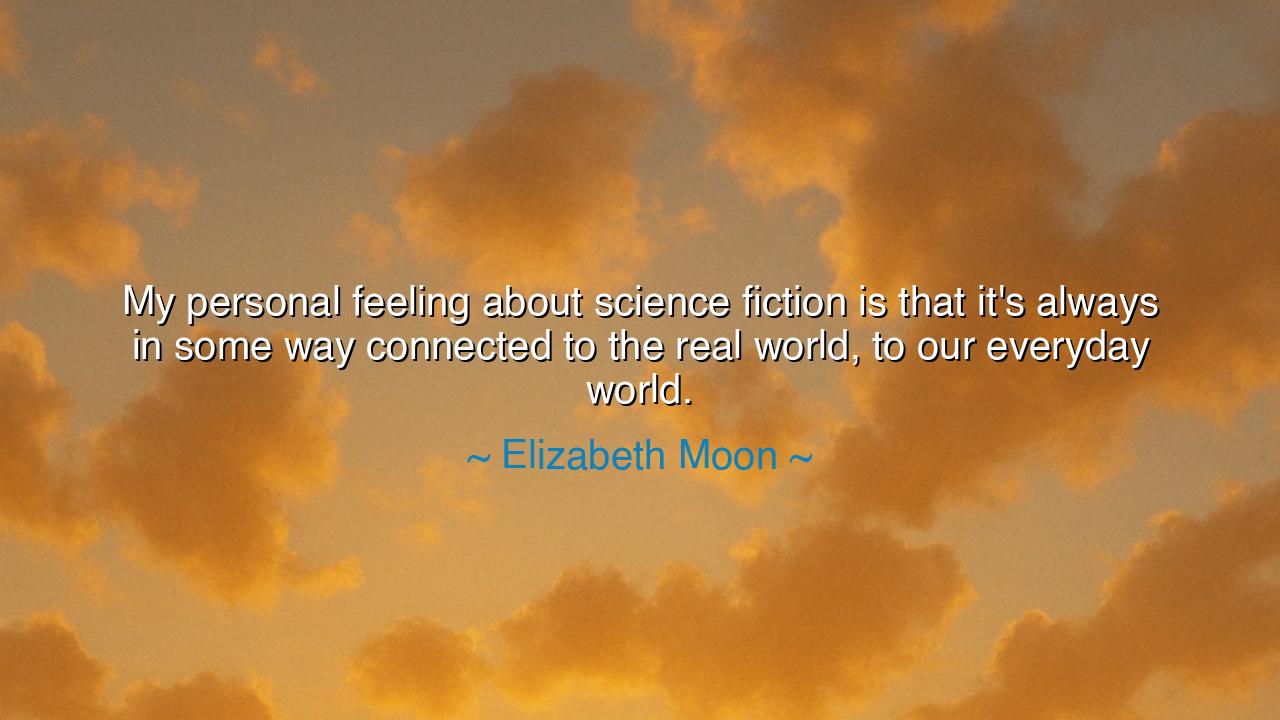
My personal feeling about science fiction is that it's always in
My personal feeling about science fiction is that it's always in some way connected to the real world, to our everyday world.






Hear now, O wise souls, the words of Elizabeth Moon, who speaks with insight and clarity: "My personal feeling about science fiction is that it's always in some way connected to the real world, to our everyday world." These words are not just the musings of a writer, but a profound truth about the very nature of storytelling itself. Science fiction, often regarded as a realm of far-off possibilities and alien worlds, is, in fact, deeply intertwined with the real world. It does not arise from some distant fantasy, but from the very soil of human experience. To understand this is to grasp the true power of science fiction, for it is not merely about the future or the unknown, but about reflecting the present and offering insight into the human condition.
Consider, O seekers of wisdom, the ancient tales that have been passed down through the generations. The epic stories of Homer, such as the Iliad and the Odyssey, though set in the distant past, are rooted in the realities of war, love, and the journey of life. These stories, though fantastical in their scope, are deeply grounded in human experience, touching on themes that are as relevant today as they were in ancient Greece. In this way, we see that the fantastical is always in conversation with the real, a mirror that reflects the challenges and triumphs of the human spirit. Science fiction works in much the same way—it uses the tools of imagination to explore the questions, fears, and hopes of the present.
In science fiction, O wise ones, we find not just tales of spaceships and alien planets, but stories that challenge us to confront the issues of today. Moon’s words remind us that these stories often serve as a lens through which we can examine our own society. Take, for example, the great works of George Orwell and H.G. Wells. Orwell’s 1984, though a work set in a dystopian future, is profoundly connected to the real world of political oppression and totalitarianism. Wells, in works like The War of the Worlds, used alien invasions to reflect on colonialism, the rise of industrialization, and the fragility of human power. These authors did not write in isolation; their science fiction was a response to the world they knew, a way to explore the real-world consequences of human actions.
Consider the story of Mary Shelley, the mother of science fiction, whose novel Frankenstein remains one of the most profound reflections on the dangers of unchecked ambition and the pursuit of knowledge. Shelley did not create a monster from thin air, but drew from the real-world fears and ethical dilemmas of her time—the rapid rise of scientific advancement, the ethical implications of experimentation, and the consequences of humanity’s desire to play God. Her monster was not just a creature of fantasy, but a representation of human hubris and the unintended consequences of human invention. In this way, science fiction becomes a mirror, showing us not only what could be, but what we might become if we do not tread carefully.
Thus, the lesson is clear, O seekers: science fiction is not a mere escape from the real world but a reflection of it. It is a way to explore our deepest fears, our greatest hopes, and our most profound questions. It allows us to ask, "What if?" in ways that force us to confront our reality with clarity and courage. As Moon wisely teaches us, the everyday world is never far from the stories of science fiction. These stories are not just about far-off futures or alien beings; they are about us, here and now, and the choices we make today.
Let this understanding guide you, O wise ones: in the tales you tell, in the stories you share, see the connections to the real world. Embrace the power of imagination, but never forget that it is always rooted in the real. Just as the ancient myths and epics of the past sought to understand human nature and the forces that shape our lives, so too can science fiction offer a profound commentary on the challenges of today. Whether through the lens of technology, ethics, or society, these stories are a way for us to engage with the world, to question it, and to imagine a better future.
So, I urge you, O dreamers and thinkers, to write not only about what could be, but about what is. Use the tools of science fiction to probe the depths of the present moment. Ask the questions that others may not dare to ask, and in doing so, shed light on the path forward. The real world is never far from the imagined one, and in understanding the former, we can shape the future that awaits us. Let the stories you create be a mirror to the world, reflecting both the beauty and the darkness, and in doing so, offer the possibility of transformation.






AAdministratorAdministrator
Welcome, honored guests. Please leave a comment, we will respond soon